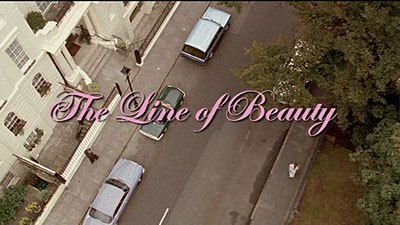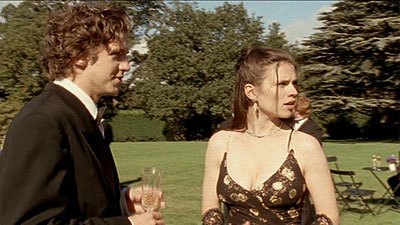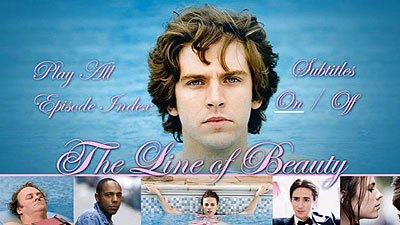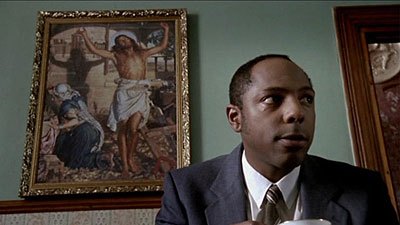| Reviews & Columns |
|
Reviews DVD TV on DVD Blu-ray 4K UHD International DVDs In Theaters Reviews by Studio Video Games Features Collector Series DVDs Easter Egg Database Interviews DVD Talk Radio Feature Articles Columns Anime Talk DVD Savant Horror DVDs The M.O.D. Squad Art House HD Talk Silent DVD
|
DVD Talk Forum |
|
|
| Resources |
|
DVD Price Search Customer Service #'s RCE Info Links |
|
Columns
|
|
|
Line of Beauty, The
Living the life in gay '80s England

Loves:
Likes: Book adaptations
Dislikes: British period pieces
Hates: Being bored, class-war dramas
The Show
I'm not going to pretend I have a very strong understanding of the Thatcher era in England, and as a result, it feels like I'm missing something when I watch "The Line of Beauty." Then, I'm sure '80s movies set in America don't speak all that strongly to Europeans my age. It's simply a lack of context. In fact, there seems to be a lot of missing in terms of context for me, as I just don't have a lot of experience in the world of British politics and high society, nor a lot of interest either.
If you have either, the story of the not-so-subtly named Nick Guest, a middle-class college boy lodging at the home of his rich friend Toby, might appeal to you. It's got a bit of everything, from a political family with secrets to spare and upper-crust ennui, to troubled gay relationships and drug-fueled parties. And though set in the '80s, with the three hour-long episodes covering three time periods in Nick's life, there's nothing distinctly '80s about it. In fact, if not told when the film takes place, you'd have only the period music and some references to government officials to clue you in. In those ways, the show is more universal than the Merchant-Ivory lite it looks like.

There are two main stories working their way through the series, both with Nick at the center. The first is a fish-out-of-water story, as Nick sees how the other half lives, shacking up with Toby's family, which includes Gerald, his politician father, and Cat, his emotionally disturbed sister. The divisions in British society are stunningly clear, as are the hypocrisies and hunger for power among the decision makers. Nick stumbles face-first into this web of lies and deceit, and though he tries to remain detached from it all, his connection to Toby's family draws him into trouble nonetheless. The close bond he forms with Toby's forgotten sister only makes this worse for him, as he watches her come apart, and watches Gerald become consumed by his political aspirations.
The other story focuses on Nick's sexuality, as he finds love and loses it, trying to keep pace with the hedonistic world of anonymous sex and frequent drug use that marked the gay scene at the time. As one might expect from the time period, the spectre of AIDS raises its head, and Nick struggles with how people see him and the risks he faces. Disease is not his only concern, as the expectations of those around him are high, and his health, and that of his lovers, becomes intertwined with Gerald's storyline. It all builds to aheart-wrenching conclusion, but sadly, no real ending. Though many things have happened, it's hard to say that Nick has changed all that much from the first frame to the last, or at least if he has, and he should have, he doesn't show it. That's a big difference from the dramatic shift he makes at the end of the second episode. In the end, we just leave a life in much the way we found it. But maybe that's the point.
The structure of the series, which jumps three years and then another one year, frees up the filmmakers to focus on the details and nuances of the story, instead of just progressing the plot, as the gaps between episodes are where most of the movement occurs, only to be referenced later on. It's almost like dropping in on friends after not seeing them for a while, and having to play catch-up. They won't exactly give you a summary, so you have to pick things up during conversation. There's plenty of that to go around though, and plenty to talk about. It's just the pacing that needs some fixing.

The DVD
Packaged in a standard keepcase, this one-disc release has a static, anamorphic widescreen main menu, with options to watch the entire show, select episodes and adjust languages. There are no audio options, but subtitles are available in English. There is no closed captioning.
The Quality
The anamorphic widescreen transfer is good, but not great, thanks to color that feels a bit flat and dull, and excessive grain during darker scenes. On the other hand, there's no dirt or damage on the transfer and there are no noticeable digital artifacts and no edge enhancement.
Unfortunately, this film is presented with a Dolby Digital 2.0 soundtrack. I say unfortunate, because the soundtrack is loaded with great '80s British hit songs, including bands like New Order, Frankie Goes to Hollywood, The Stranglers and the Pretenders. Though we only get two channels, they are strong, and the dialogue is pretty crisp. There's even some slight separation between the two sides of the sound, which is a nice touch.
The Extras
There are no extras included on this DVD.

The Bottom Line
There are a couple of interesting stories in this series, but one's been rather done to death at this point, and the other requires something of an understanding of the era of British politics to fully enjoy. If you're looking for a well-constructed gay-themed drama, this isn't a bad pick, but on its merits as just a film, it doesn't stack up as high. The DVD looks decent, though a bit dull and grainy, and sounds good, but there are no extras to check out. Give this one a rental if it fits your tastes, but don't expect to have it change your opinions if you try it as a shot in the dark.
Francis Rizzo III is a native Long Islander, where he works in academia. In his spare time, he enjoys watching hockey, writing and spending time with his wife, daughter and puppy.Follow him on Twitter
*The Reviewer's Bias section is an attempt to help readers use the review to its best effect. By knowing where the reviewer's biases lie on the film's subject matter, one can read the review with the right mindset.
|
| Popular Reviews |
| Sponsored Links |
|
|
| Sponsored Links |
|
|
| Release List | Reviews | Shop | Newsletter | Forum | DVD Giveaways | Blu-Ray | Advertise |
|
Copyright 2024 DVDTalk.com All Rights Reserved. Legal Info, Privacy Policy, Terms of Use,
Manage Preferences,
Your Privacy Choices | |||||||














